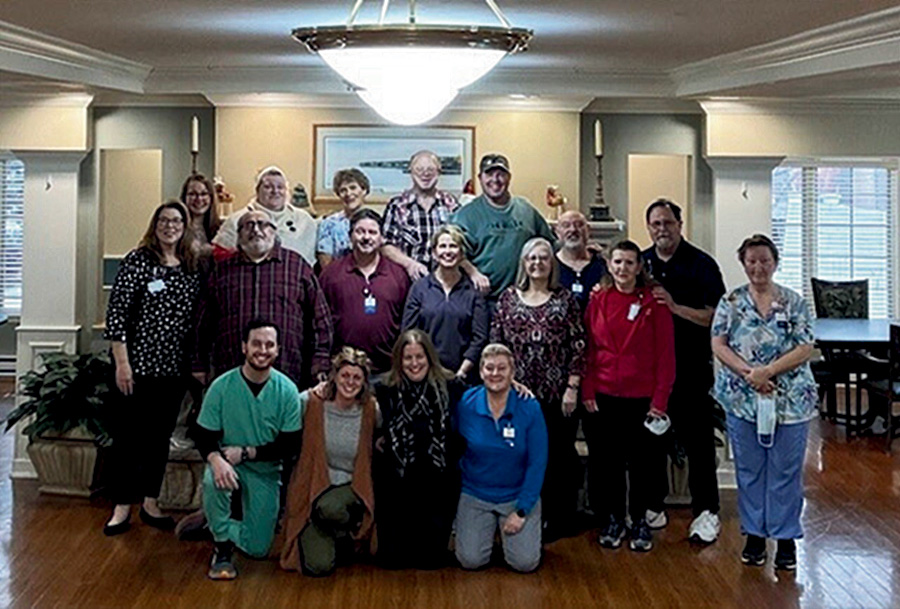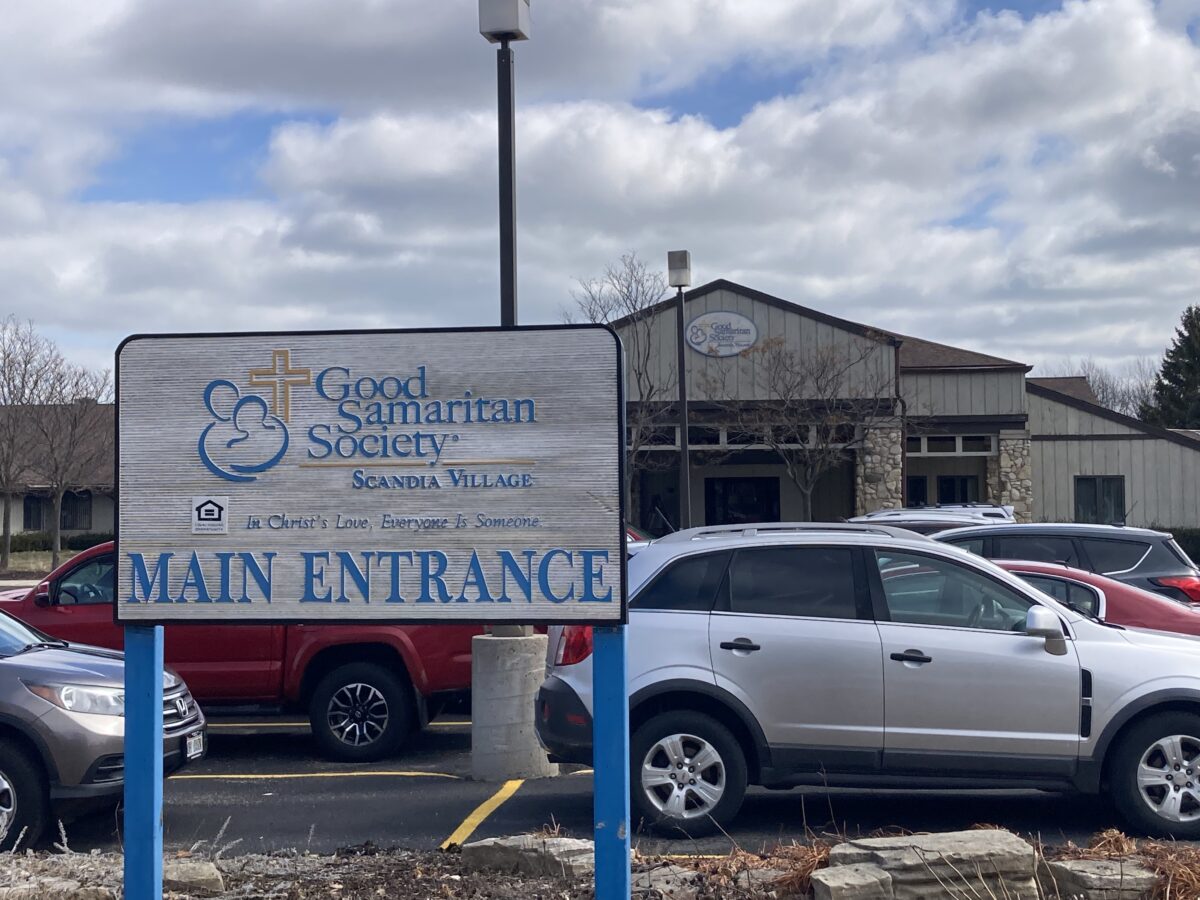Falling Short: Rebuilding elderly care in rural America
Rural nursing homes across the country, already understaffed, face significant new federal staffing requirements. With on-the-ground reporting from the Institute for Nonprofit News’ Rural News Network and data analysis assistance from USA TODAY and Big Local News at Stanford University, seven newsrooms, including Door County Knock, explore what the rule change would look like for residents in communities across America. Support from The National Institute for Health Care Management (NIHCM) Foundation made the project possible.
After a rocky few years, culminating in the loss of staff members and $58,425 in penalties, Scandia Village in Sister Bay has transferred ownership for the second time since 2019. Representatives of the new owner, Continuum Healthcare, and other stakeholders say they are optimistic about the future of the skilled nursing facility.
Scandia is not alone in its struggles with staffing. The U.S. has been experiencing a skilled nursing care staff shortage for decades. Staffing ratios have direct ties to the quality of care that aging and disabled residents receive. Continuum, a privately owned company, is acutely aware of these issues and has plans to address them, according to the company’s chief operating officer, Cheryl Dorn.
The purchase of Scandia by Continuum was finalized at the end of January 2024. Continuum is owned by Daniel Bruckstein and based in New Jersey. Its portfolio includes eight nursing homes in New Jersey, Ohio, Pennsylvania and Wisconsin, with plans to further expand into the Midwest, according to Dorn.
The Centers for Medicare and Medicaid Services is the regulatory agency responsible for nursing homes. CMS issued a landmark study in 2001 concluding higher nursing staff-to-resident ratios lead to better outcomes for residents.
The staffing guidelines provided by the study are not mandates, however. Some states, including Wisconsin, have minimum staffing levels mandated, though all of them are lower than CMS’s recommendations.
In September 2023 the Biden administration issued a proposal to federally regulate nursing home staff levels. The proposal is still working through Congress, but according to payroll data, no Door County skilled nursing facilities meet CMS guidelines or the much lower federally proposed minimums.
The Biden proposal would require nursing homes to have an RN on duty 24/7 and provide almost 3.5 hours of nursing care per resident per day, with one of those hours provided by an RN and the rest by a CNA.
Wisconsin requires 2.5 hours of skilled nursing care per resident per day. Thirty minutes of that is to be performed by an RN or LPN.
Recommended staffing minimums established in a 2001 CMS report are higher than any issued by the states or the proposed federal minimums: 4.1 hours of nursing care split between RNs, LPNs, and CNAs.
Scandia was started in 1981 by a group of locals who called themselves the Senior Citizens Agency of Northern Door, or SCAND. The Evangelical Lutheran Good Samaritan Society owned the facility and managed day-to-day operations until 2019, when Good Samaritan became a subsidiary of Sanford Health.
According to CMS, Scandia has a total capacity of 150, including independent and assisted living units. There are 100 residents currently. There are 50 certified skilled nursing units and, on average, 32 of them are filled daily.
No one came
In 2022, one of those units was home away from home for lifelong Washington Island resident LeVaun Mann. After a fall resulting in a broken neck in 2017, the 90-year-old had to be moved to skilled nursing care. She was transferred to Scandia after a short stint at the Dorchester, which is now Sturgeon Bay Health Services.
Granddaughter-in-law Michelle Mann visited LeVaun regularly and was happy with the care she initially received at Scandia, she reported. LeVaun suffered a stroke in July 2022, while she was living there. When Michelle visited her shortly afterward, her feelings about LeVaun’s care changed, she said.
From 2021 to 2022, Scandia had several key members of staff leave, including long-term and senior staff members, and the facility began depending more on state agency-supplied short-term nursing staff. Agency-supplied nursing aides receive higher salaries, which raises labor costs.
With fewer employees, the facility is unable to safely admit as many residents as it has the capacity for, compounding financial issues, according to Katie Casey, the Midwest regional director for Continuum.
During Michelle’s visit, LeVaun needed help to get to the restroom. When they pressed the nurse call button, no one came for what felt like a long time, according to Michelle.
She eventually left the room to find someone, she said. The nurse’s station was empty, and Mann located a member of the kitchen staff to get someone to LeVaun’s room.
“It was traumatic. It felt like a sad place,” Michelle said.
Complaints, inspections, fines
Danelle Nickchen worked as a certified nursing assistant, or CNA, at Scandia during the switch in ownership to Sanford Health. She noticed a decline in staff around that time, and it seemed like management was trying to cut costs, she said.
During a shift in October 2022, Nickchen was the only staff member responsible for 13 residents in the memory care unit. She got “fed up,” she said. She filed a complaint with CMS, which is also responsible for inspecting homes that receive Medicare and Medicaid funding to determine they are meeting care requirements.
A nursing home’s failure to meet any care requirement is called a deficiency. The inspection report filed on Nov. 2, 2022, as a result of Nickchen’s complaint, contained 10 deficiencies and resulted in $58,425 in fines. CMS data collected through February 2024 shows the average fine for the last three inspection cycles — about three years — in Wisconsin is $22,839.
Names are redacted in inspection reports for confidentiality reasons, and one licensed practical nurse described as being at Scandia for multiple years is identified as LPN-G. LPN-G was working double shifts totalling between 50 and 60 hours a week, according to the reports. LPN-G is quoted as saying, “staff never know who was going to show up for their shift, every day for at least the last couple of months.”
Payroll data in the inspection report shows one CNA worked between 85 hours and 107 hours every week for three weeks in October 2022.
Other deficiencies listed on the inspection report include: skipping steps in handwashing and hygiene practices; inoperative door guards on the memory care unit; memory care residents left unsupervised for short times; residents not provided with incontinence care, repositioning, showers, oral care and clean clothing in a timely manner; and medications administered after sleeping hours, resulting in residents being woken up.
None of the deficiencies resulted in serious harm to a resident, but almost all of them were related to staffing issues, according to the report. Ultimately, the inspection concluded based on observation, resident interviews and staff interviews, that Scandia did not have sufficient nursing staff to ensure the 11 residents reviewed in the inspection – out of 23 total – “maintained the highest practicable physical, mental, and psychosocial well-being.”
Many factors
Conditions at Scandia Village in fall of 2022 were the result of “a perfect storm” of issues, according to Kathy Wagner. Wagner is a retired nurse, former Scandia nursing director and member of a community task force that was formed in September 2022 to address some of the issues at the facility.
A decades-long national nursing shortage, the Covid-19 pandemic and a change in ownership combined to result in “a mass exodus” of employees, Wagner said.
Scandia Village managed to avoid most of the staffing problems elsewhere for a long time, Wagner said, but things changed when Sanford bought out Good Samaritan. Sanford did away with a community advisory board, she said, and did not have the same values and philosophy Good Samaritan had maintained for years.
“People were being asked to do double shifts, they were called away from normal positions to do something else, called at midnight to come in at six in the morning,” Wagner said. “People just wore out.”
Fewer staff and more traveling aides unfamiliar with the facility, coupled with a heavily regulated industry like skilled long-term nursing means deficiencies can add up quickly, according to Wagner. “There’s no such thing as a perfect facility. If you nitpick, you’ll find something,” she said.
However, she described a flippant attitude from Sanford to inspection survey results. One survey at Scandia yielded 16 deficiencies and a Sanford executive, whom Wagner declined to name, told her, “Sixteen is nothing; we have facilities like that all the time.”
Despite multiple attempts, representatives from Sanford Health could not be reached for comment.
Before her retirement, Wagner said, it was unusual for Scandia to receive more than four deficiencies during an inspection.
She said she is “cautiously optimistic” about Continuum’s acquisition of the nursing home, but Continuum is facing the same problems everyone in the long-term skilled nursing care industry is facing. Assistance needs have changed over the last decade or so, according to Wagner. People are living longer and often have complex medical needs.
“People don’t just come into the nursing home needing some assistance, they come in needing a lot of assistance,” Wagner said. Something is better than nothing, she said, but working to make local nursing homes better will benefit the whole community.
Looking ahead
Bob Lindahl does not want to dwell on the past. He is a member of the same task force as Wagner. It is made up of residents’ family members, community members and long-term volunteers. The task force was formed to raise awareness and bring some attention to issues that were arising at Scandia during 2022, said Lindahl, who is the de facto leader of the group.
The local community and Scandia have an enmeshed history, according to Lindahl. The facility was started by a group of local citizens and “that interest never left,” he said.
“We wanted to help turn things around,” Lindahl said.
Continuum has been working with task force members, he added, and he is pleased and surprised by the company’s transparency and willingness to meet with members and get community input.
Continuum has also started filling administrative positions with locals, according to company representatives. The current director of nursing and an administrator have been promoted from within the existing staff and are Door County residents, said Dorn, the COO.
Casey, the regional director, said she agrees with Wagner’s “perfect storm” analogy to explain the issues Scandia faced in fall 2022. She said she called every single person who quit in 2021-2022 to find out why they left. Some of them had been at Scandia for 20 or 30 years and were tired or burned out from Covid-19, or there were family and community reasons — a multitude of things, she said.
“It was a culmination of poor leadership, change in leadership, and then you throw a pandemic on top of it,” she said.
Sanford, a not-for-profit tax-exempt hospital system, is very corporate, and Continuum — a for-profit company — is more personal and “human”, according to Casey, who served as interim director of Scandia for Sanford, before moving into the position she now holds with Continuum.
Continuum is maintaining ties to the task force and developing an advisory community group.
“How it is connected to the community is key to supporting Scand’s growth,” Dorn said, and Continuum plans to enhance that connection with quarterly meetings with task force and community partners, as well as clinical partners like Door County Medical Center, and current staff and residents, to develop programming that raises the quality of care at Scandia.

The company has plans to implement stronger marketing techniques for staff recruitment, Casey said, but it is not an easy or quick fix to staffing shortages. Scandia is still relying heavily on state agency nursing staff, a common practice for many nursing homes. Besides higher labor costs, the use of traveling aides has the potential to disrupt continuity of care, especially if there are aides that change frequently.
Continuum is attempting to mitigate this issue by extending state contracts so traveling aides stay at Scandia for longer. Currently one state aide has been there for more than a year, and there are a few who have been there for longer than six months, according to Casey. Continuum also is trying to hire some of the state aides on a permanent basis, she said, though finding housing is a problem.
Housing is one of the biggest barriers to recruiting staff, especially for anyone relocating to Door County, Casey said. Some staff members are currently being housed at Scandia in the independent living apartments, and that means those units are not available for residents.
The company also changed the facility’s name; it is now called Serenity Spring Senior Living at Scandia Village. The name change reflects a new beginning while staying true to Scandia’s roots within the local community, Casey said.
Additionally, rumors have been circulating since last year about the fate of Bargains Unlimited, a charity thrift shop staffed by volunteers and connected to the facility. The shop uses a portion of its profits to donate back to the nursing home.
Further definition of the relationship between the non-profit shop and the for-profit Continuum is necessary, but Dorn was emphatic on the topic. “We totally support it — what a gem it is for the community, for the campus,” she said. “We definitely have no thoughts about closing it ever.”
Lindahl is pleased so far with Continuum’s willingness to work with the task force. “We want to give them time to get their feet on the ground, but I am delighted they have already met with members and are willing to keep meeting and working with us,” he said. It is an approach that is unusual for a healthcare company, Lindahl said, and getting access to executives is almost unheard of in his experience.
“We want to lighten the load of staff and help to make sure residents feel respected and cared for,” he added, regarding the task force’s role going forward. “The last thing they need is me to be nitpicking. We want to be supportive and over time develop a relationship.”
Lindahl encourages anyone interested to get involved with Scandia and its long history of community volunteerism. It can be as simple as calling the front desk and telling them you’re interested in volunteering in some capacity, he said. Spending time with residents, reading to them, or talking to them goes a long way, he added.
Correction: A previous version of this story stated that a Biden administration proposal to federally regulate nursing home staff levels was issued in 2022. It in fact was issued in September 2023. The story has been updated.

